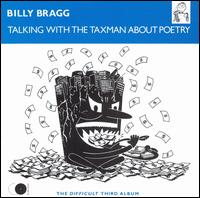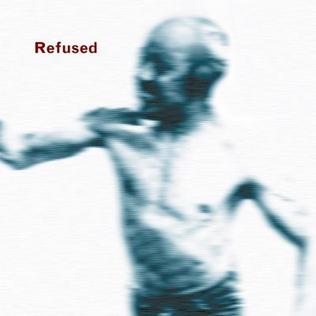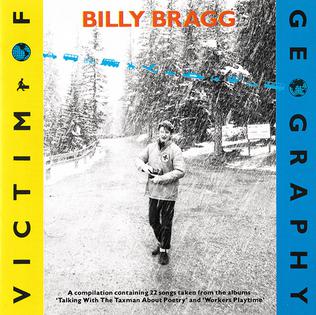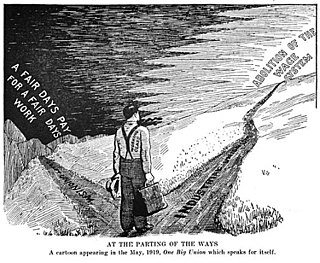| "There Is Power in a Union" | |
|---|---|
| Song | |
| Language | English |
| Published | 1913 |
| Songwriter(s) | Composer: Lewis E. Jones Lyricist: Joe Hill |
"There Is Power in a Union" is a song written by Joe Hill in 1913. The Industrial Workers of the World (commonly known as the Wobblies) concentrated much of its labor trying to organize migrant workers in lumber and construction camps. They sometimes had competition for the attention of the workers from religious organizations. The song uses the tune of Lewis E. Jones' 1899 hymn "There Is Power in the Blood (Of the Lamb)". [1]
"There Is Power in a Union" was first published in the Little Red Songbook in 1913, and has been recorded several times.
Billy Bragg reused the title for his 1986 song "There Is Power in a Union" on the Talking with the Taxman About Poetry album, [2] which is set to the tune of "Battle Cry of Freedom". [3]
Would you have freedom from Wage slavery,
Then join in the grand Industrial band;
Would you from mis'ry and hunger be free,
Then come, do your share, like a man.
There is pow'r there is pow'r in a band of workingmen,
When they stand hand in hand,
That's a pow'r, that's a pow'r
That must rule in every land—
One Industrial Union Grand.
Would you have mansions of gold in the sky,
and live in a shack, way in the back?
Would you have wings up in heaven to fly,
And starve here with rags on your back?
If you've had 'nuff of the "blood of the lamb"
Then join in the grand industrial band;
If, for a change, you would have eggs and ham,
Then come, do your share, like a man.
If you like sluggers to beat off your head,
Then don't organize, all unions despise.
If you want nothing before you are dead,
Shake hands with your boss and look Wise.
Come, all ye workers, from every land,
Come, join in the grand industrial band;
Then we our share of this earth shall demand.
Come on! Do your share, like a man.— Gibbs M. Smith, Joe Hill, Peregrine Smith Books, Salt Lake City, 1969/1984, pages 249–250
A version of the song (with altered lyrics) is used in the Wasteland 3 DLC The Battle of Steeltown (2021). [4]

The Industrial Workers of the World (IWW), whose members are nicknamed "Wobblies", is an international labor union founded in Chicago in 1905. The nickname's origin is uncertain. Its ideology combines general unionism with industrial unionism, as it is a general union, subdivided between the various industries which employ its members. The philosophy and tactics of the IWW are described as "revolutionary industrial unionism", with ties to socialist, syndicalist, and anarchist labor movements.

Stephen William Bragg is an English singer, songwriter, musician, author and political activist. His music blends elements of folk music, punk rock and protest songs, with lyrics that mostly span political or romantic themes. His activism is centred on social change and left-wing political causes.

Talking with the Taxman About Poetry is the third album by Billy Bragg, released in September 1986. With production by John Porter and Kenny Jones, Talking with the Taxman About Poetry featured more musicians than Bragg's previous works, which were generally little more than Bragg himself and a guitar.

Joe Hill, born Joel Emmanuel Hägglund and also known as Joseph Hillström, was a Swedish-American labor activist, songwriter, and member of the Industrial Workers of the World. A native Swedish speaker, he learned English during the early 1900s, while working various jobs from New York to San Francisco. Hill, an immigrant worker frequently facing unemployment and underemployment, became a popular songwriter and cartoonist for the union. His songs include "The Preacher and the Slave", "The Tramp", "There Is Power in a Union", "The Rebel Girl", and "Casey Jones—the Union Scab", which express the harsh and combative life of itinerant workers, and call for workers to organize their efforts to improve working conditions.
A work song is a piece of music closely connected to a form of work, either one sung while conducting a task or one linked to a task that may be a connected narrative, description, or protest song. An example is "I've Been Working on the Railroad".

"Solidarity Forever", written by Ralph Chaplin in 1915, is a popular trade union anthem. It is sung to the tune of "John Brown's Body" and "The Battle Hymn of the Republic". Although it was written as a song for the Industrial Workers of the World (IWW), other union movements, such as the AFL–CIO, have adopted the song as their own. The song has been performed by musicians such as Utah Phillips, and Pete Seeger. It was redone by Emcee Lynx and The Nightwatchman. It is still commonly sung at union meetings and rallies in the United States, Australia and Canada, and has also been sung at conferences of the Australian Labor Party and the Canadian New Democratic Party. This may have also inspired the hymn of the consumer cooperative movement, "The Battle Hymn of Cooperation", which is sung to the same tune.

Songs to Fan the Flames of Discontent is the second full-length album by Swedish hardcore punk band Refused. It was released in 1996 through Victory Records, Startrec and We Bite on CD, tape and 12" vinyl; and reissued by Burning Heart Records and Victory in 1997. A remastered version of the album was released in 2004.

"Marching Through Georgia" is a marching song written by Henry Clay Work at the end of the American Civil War in 1865. The title and lyrics of the song refer to U.S. Army major general William T. Sherman's "March to the Sea" to capture the Confederate city of Savannah, Georgia in late 1864.
Matti Valentin Huhta, better known by his pen name T-Bone Slim, was a Finnish-American humorist, poet, songwriter, hobo, and labor activist, who played a prominent role in the Industrial Workers of the World (IWW).
"The Preacher and the Slave" is a song written by Joe Hill in 1911. It was written as a parody of the Christian hymn "In the Sweet By-and-By". Copying or using the musical style of the hymn was also a way to capture the emotional resonance of that style of music and use it for a non-religious purpose.
"The Tramp" (1913) is, together with "The Preacher and the Slave," one of labor organizer Joe Hill's most well-known songs. The lyrics tell about an able-bodied but unemployed man who wanders around looking for work, but is not welcome anywhere – even in church, Heaven, and Hell – and thus must "keep on a-tramping".

Victim Of Geography is a 1993 collection of Billy Bragg's previous albums Talking with the Taxman about Poetry and Workers Playtime, originally released in 1986 and 1988 respectively.
Free speech fights are struggles over free speech, and especially those struggles which involved the Industrial Workers of the World and their attempts to gain awareness for labor issues by organizing workers and urging them to use their collective voice. During the World War I period in the United States, the IWW members, engaged in free speech fights over labor issues which were closely connected to the developing industrial world as well as the Socialist Party. The Wobblies, along with other radical groups, were often met with opposition from local governments and especially business leaders, in their free speech fights.
Wobbly lingo is a collection of technical language, jargon, and historic slang used by the Industrial Workers of the World, known as the Wobblies, for more than a century. Many Wobbly terms derive from or are coextensive with hobo expressions used through the 1940s.

The Industrial Workers of the World (IWW) is a union of wage workers which was formed in Chicago in 1905 by militant unionists and their supporters due to anger over the conservatism, philosophy, and craft-based structure of the American Federation of Labor (AFL). Throughout the early part of the 20th century, the philosophy and tactics of the IWW were frequently in direct conflict with those of the AFL concerning the best ways to organize workers, and how to best improve the society in which they toiled. The AFL had one guiding principle—"pure and simple trade unionism", often summarized with the slogan "a fair day's pay for a fair day's work." The IWW embraced two guiding principles, fighting like the AFL for better wages, hours, and conditions, but also promoting an eventual, permanent solution to the problems of strikes, injunctions, bull pens, and union scabbing.

"The Red Flag" is a socialist song, emphasising the sacrifices and solidarity of the international labour movement. It is the anthem of the British Labour Party, the Northern Irish Social Democratic and Labour Party and the Irish Labour Party. It was formerly used by the New Zealand Labour Party until the late 1940s. The song is traditionally sung at the close of each party's national conference.

"Waiting for the Great Leap Forwards" is a 1988 song by English singer/songwriter Billy Bragg. The song was released as an advance single from the album Workers Playtime on August 30, 1988. Bragg was accompanied on the original recording by Martin Belmont, Bruce Thomas, Cara Tivey, Mickey Waller and Bragg's long-standing roadie Wiggy, with backing vocals by Michelle Shocked and Phill Jupitus among others. The recording was produced by Joe Boyd with Wiggy. The single had two songs on the b-side: a re-recording of Bragg's "Wishing the Days Away" featuring Tivey, and a cover of the Flying Burrito Brothers' "Sin City" featuring Hank Wangford, both produced by John Porter and Kenny Jones.
"There Is Power in a Union" is a song written by Billy Bragg and first released on his 1986 Talking with the Taxman About Poetry album. It is set to the tune of George Frederick Root's "Battle Cry of Freedom".
"There Is Power in the Blood" is a hymn written in 1899 by Lewis E. Jones. The song lends its tune to the 1913 song "There Is Power in a Union" by activist Joe Hill. "There is Power in the Blood" has been performed by Angela Primm, Dolly Parton, Marty Robbins, Alan Jackson and Bill and Gloria Gaither.